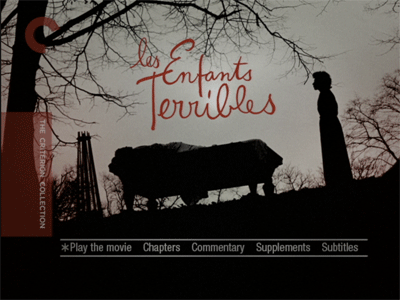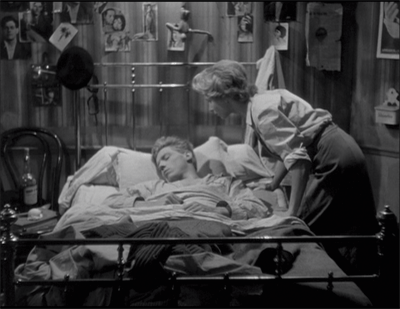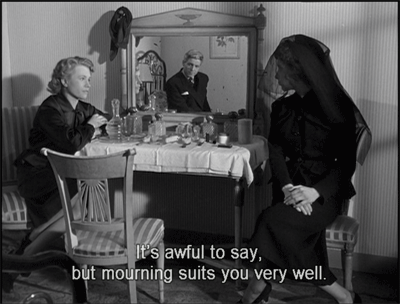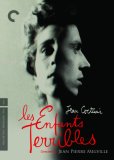| Reviews & Columns |
|
Reviews DVD TV on DVD Blu-ray 4K UHD International DVDs In Theaters Reviews by Studio Video Games Features Collector Series DVDs Easter Egg Database Interviews DVD Talk Radio Feature Articles Columns Anime Talk DVD Savant Horror DVDs The M.O.D. Squad Art House HD Talk Silent DVD
|
DVD Talk Forum |
|
|
| Resources |
|
DVD Price Search Customer Service #'s RCE Info Links |
|
Columns
|
|
|
Les Enfants Terribles: Criterion Collection
THE MOVIE:

Midway through Les enfants terribles, the titular children, strange brother and sister duo Elisabeth (Nicole Stéphane) and Paul (Edouard Dermithe), create a game where they must each shoplift something entirely useless from a seaside store. They even force their spineless pal Gérard (Jacques Bernard) to go along with it, sending him back in for another, larger item when he breaks the rules and turns up with a hair brush. Jean Cocteau, the narrator, who also happens to be the author of the film and the novel it is based on, informs the audience that this pointless action has been undertaken simply so the kids can feel they are dangerous, nothing more. Random cruelty with no result.
It's the nutshell scene of Les enfants terribles, the moment that crystallizes the themes and the characters. The 1950 film, newly released on DVD in North America by the Criterion Collection, was adapted by Jean Cocteau and the master French filmmaker Jean-Pierre Melville, working from the writer's most famous novel, and what they came up with was borne of one of the most contentious partnerships in film history. The friction created real sparks, however, and they all end up on the screen. You can even argue that the pull the real world threatens to exert on Elisabeth and Paul in the picture is symbolic of these two headstrong artists working toward one goal. The grounded reality of a Melville movie meets the flighty interior opera of a Cocteau piece, and it's magic.
The film opens at a boy's school during winter. A snowball fight erupts, and Paul takes a shot in the chest. He's a weak boy, and it fells him, taking him out of school for the duration. The effeminate student who hurled the offending snowball is Dargelos (Renée Cosima), who becomes a sort of spectral image of death that haunts Paul from there on out. Dargelos becomes the poster boy for everything that Paul cannot do, the life he is too precious to live. Paul surrounds himself with photos of boxers and actors, all of whom have an eerie resemblance to Dargelos and also a much more interesting life than Paul himself.
Paul shares his photo-laden room with Elisabeth, his sister. She has already given up her life in order to care for their sick mother, and the two create their own world within the confines of their apartment, crafting strange codes and games that only they understand how to play. When their mother dies, so goes the last remaining boundaries. The kids are now free to live their lives as petulantly and abstractly as they want. Picture them as more isolated ancestors to Bertolucci's siblings in The Dreamers. Without the pop-culture backbone to weave their dramas around, they must invent every macabre scenario themselves. When Gérard is not around to pick on, they attack each other. When he is there, they use him as a pawn. As the film proceeds, they get more selfish, more demeaning, and any sense of a family bond completely erodes.
Things get particularly nasty once love enters into the picture. There are ill-defined incestuous overtones to the relationship between Elisabeth and Paul. They often gaze at one another with feral, lusty eyes. Melville uses mirrors as places where they not only search for their true selves, but where their sibling lurks behind them, waiting for what is to be revealed. Gérard loves Elisabeth, but he's too scared to admit it, and when she brings home a co-worker, Agathe, Paul is immediately smitten with her. Yet, rather than deal with it, he taunts her mercilessly. By some coincidence, she looks just like Dargelos (and is, in fact, played by the same actress), which is a big part of his obsession with her, and also the signal that she will eventually be the catalyst for the final moves in both Elisabeth and Paul's grand games.
Jean Cocteau's narration intrudes on the scene regularly, often explaining what we are looking at in a replication of detail, and also commenting on it. He points out the characters' lies, mistakes, and self-denial. He practically dictates their actions like a malicious god, or maybe another mean little child like the ones he writes about, trapping these rodents in a maze of his design. There is certainly an echo of a deus ex machina in the fatal car crash that takes Elisabeth's rich American husband (Melvyn Martin) from her the day after their wedding. Melville shows the wreckage while Cocteau explains his famous metaphor of the spinning wheel of the car being like the seemingly dwindling yet continuous nature of human life.
This moves the quartet of teens to a new home, a massive mansion with eighteen rooms and an unwieldy gallery where the dead man collected art objects willy nilly. This ups the scale of the drama, shifting the story into the final act and sending Elisabeth and Paul down the track toward their most evil, self-serving games. Melville frames everything with a haunting staginess. Characters often look up into an unspecified light, standing frozen as a moment is marked and pondered. Their lives are so far removed from reality, their environment so abstract, it's only the camera that can confine them.

THE DVD
Video:
The image transfer for Les enfants terribles - Criterion Collection is very good. The black-and-white tones are nicely balanced, and the image is largely clean, with only the occasional scratches or flickers. The picture is full frame, but picture boxed so that it will appear with borders on all four sides on widescreen TVs.
Sound:
Particularly excellent work has been done on the mono mix of the original French audio. The Vivaldi music that scores the scenes sounds clear and grandiose.
The English subtitles are well rendered and easy to read.
Extras:
Most of the extras are concerned with the debate about how much Cocteau did on Les enfants terribles vs. how much Melville did. Some claim it's more Cocteau's picture, and others say Melville steered the ship through and through. The first feature, About the Film (14 minutes), cuts together contemporary interviews with producer Carole Weisweller, assistant director Claude Pinoteau, and actor Jacques Bernard. None of them seem to agree. A 2003 interview with Nicole Stéphane (12 minutes, with more film clips than interview, it feels like) was shot for French television on the 40th anniversary of Cocteau's death, and she avoids specifics while celebrating the memory of the artist. Finally, Around Jean Cocteau (16 minutes) shows Noël Simsolo talking in separate sessions with critics Dominique Païni and Jean Narboni as they walk amongst a museum retrospective of Cocteau's work. These two are unfairly biased in favor of Cocteau, and their arguments go the longest way to poke holes in the haughty presumption of critics and academics. The discussion seems unfairly balanced and full of speculation by people who, let's face it, weren't there. While that can be interesting, it's not always accurate. As anyone who has ever been involved in a creative collaboration knows, when there is this much smoke and no official fire, chances are that the truth lies somewhere in the middle. Truffaut noted it best when he said Cocteau's novel resulted in, what he felt, was Melville's best film. Neither could have made Les enfants terribles in the same way without the help of the other.
The full-length audio commentary by writer Gilbert Adair, of course, touches on this, as well. Adair's track is from the British Film Institute DVD of Les enfants terribles, and the novelist is an apt choice, having written the story that Bertolucci used as the basis for the aforementioned The Dreamers. Adair gives credit to both sides of the Les enfants coin and is probably the most fair opinion here. He gives us a greater context of the work and how it fits in the oeuvre of both Cocteau and Melville, and also roots around in the themes and stylistic choices made in the staging and final edit.
A stills gallery features on-set photos and a couple of poster designs. The vintage trailer is worth looking at for its juxtaposition of illustrations Cocteau drew for his novel with the corresponding shots in the film. It's also kind of enviable how much play the source material used to get in movie promotion. The interior booklet in the DVD case also has a lot of Cocteau's drawing to lend some flash to essays by Gary Indiana and Nicole Stéphane and excerpts from an interview with Jean-Pierre Melville from Melville on Melville.
FINAL THOUGHTS:
Les enfants terribles - Criterion Collection is Highly Recommended. A sometimes abstract and isolated drama of scheming and adolescent self-belief, this bizarre story details the questionable relationship of two siblings and the way they inflict their convoluted games on people who cross their paths. The second film by French master Jean-Pierre Melville, Les enfants terribles is a collaboration of two vivid personalities, of the filmmaker and the artist, Jean Cocteau, who originally wrote the story. Regardless of the debate about the two men's working relationship, the truth is that this strange and contentious piece of cinema required the intersection of their artistic differences. What they came up with is an intriguing, perplexing, and utterly unforgettable (a)morality play.

Jamie S. Rich is a novelist and comic book writer. He is best known for his collaborations with Joelle Jones, including the hardboiled crime comic book You Have Killed Me, the challenging romance 12 Reasons Why I Love Her, and the 2007 prose novel Have You Seen the Horizon Lately?, for which Jones did the cover. All three were published by Oni Press. His most recent projects include the futuristic romance A Boy and a Girl with Natalie Nourigat; Archer Coe and the Thousand Natural Shocks, a loopy crime tale drawn by Dan Christensen; and the horror miniseries Madame Frankenstein, a collaboration with Megan Levens. Follow Rich's blog at Confessions123.com.
|
| Popular Reviews |
| Sponsored Links |
|
|
| Sponsored Links |
|
|
| Release List | Reviews | Shop | Newsletter | Forum | DVD Giveaways | Blu-Ray | Advertise |
|
Copyright 2024 DVDTalk.com All Rights Reserved. Legal Info, Privacy Policy, Terms of Use,
Manage Preferences,
Your Privacy Choices | |||||||













